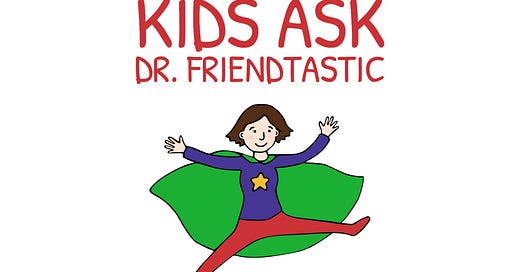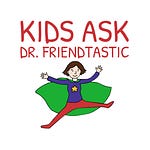(Would you rather read? A TRANSCRIPT is at the bottom of this post.)
What can Mila and her friends do about a kid who keeps bothering them?
Scroll down for some DISCUSSION QUESTIONS you can share with your child plus how to submit your child’s question.
*** For a Limited Time Only***
I've put together a Fall Friendship Bundle of three webinars and other written resources to help you help your child build strong and caring friendships.
Here's what's in the Fall Bundle:
1) Friendship Skills – for Kids! (ages 6-12)
(76 min.)
This is my best-selling webinar. It's entertaining and practical. Kids will learn about five essential friendship skills: Reaching out to make friends, Stepping Back to keep friends, Blending in to join friends, Speaking Up to share with friends, and Letting Go to accept friends. Making and keeping friends is never about just doing one thing. Children need to be able to flexibly adjust their behavior to fit the situation and their goals. This webinar helps kids learn the skills that are the foundation of every friendship.
2) Friendship in the Digital Age
(87 min.)
This is a recording of a live presentation I gave for parents on how digital media affect the way children communicate and socialize. It looks at video game playing, cyberbullying, and social media "depression," and compares them to their in-person parallels. It also discusses some recent research on how children behave online and gives lots of practical recommendations for parents.
3) Making Up and Breaking Up with Friends
(38 min.)
Most friendships hit occasional rough spots. Misunderstandings, disagreements, and hurt feelings are common but often painful experiences in children’s friendships. In this recorded Q&A session, I answer questions from parents about how to help kids handle conflicts with friends.
Until Sept. 30, 2023, the Fall Friendship Bundle is available for only $70. That's $17 off compared to buying the webinars individually. You'll be able to watch the webinars at your convenience. You'll also get brand new written notes plus a companion guide to help you remember and use the tips.
Please help the podcast grow!
I can’t do it alone. If you love the Kids Ask Dr. Friendtastic podcast, please help it continue and grow by sending in your child’s question about friendship and by asking your friends to submit their children’s questions. Here are the instructions:
Adults, please use your smartphone's memo function or an audio app to record your child's question. Hold the phone close to your child's mouth to make sure the recording is clear. Have your child state:
1) their FIRST NAME (or another name),
2) their AGE, and
3) a BRIEF QUESTION or concern about friendship. (Please do not include any friends' names.)
Email the audio file to DrF@EileenKennedyMoore.com. I’ll answer as many questions as I can. (Obviously, this is not psychotherapy, and it’s not for emergency situations.)
Think About It Questions to discuss with your child
Do you or someone you know fit the description of a high-energy kid who has trouble sitting still and tends to act without thinking about what might happen or how others might react? What are some good things about having a lot of energy? In what ways can it cause problems with adults or other kids?
What does compassion mean? Why can imagining what life is like for someone else help us gain compassion for that person? Why is it important to try to find compassion even for people who annoy us?
Dr. Friendtastic said, “If you’ve asked a kid politely to stop doing something two times, and they haven’t listened, they’re probably not going to listen.” Why is this a useful guideline? (Hint: What does it prevent you from doing? What does it allow you to focus on instead?)
We can’t control what others do, but we can control how we think about our situation. How can deciding that something someone else does isn’t important be a way of taking care of yourself?
How do you know when to ignore other kids’ misbehavior and when to go to the teacher or other adult for help?
Transcript
Welcome! I’m Dr. Eileen Kennedy-Moore, also known as Dr. Friendtastic. I’m an author and clinical psychologist based in Princeton, NJ.
Here’s today’s question:
Hello, my name is Mila, and I'm nine-years old. There's this one guy at school who's very annoying to me and my friends. He draws on our desk and calls us names. How do you think we should handle it?
Hi, Mila. Thanks for sending in your question. I can see why you’re feeling annoyed with this kid! So, what do you do when someone is trying to bother you? That’s something a lot of kids have wondered.
One important fact that you mentioned is that he’s not doing this stuff just to you; he’s also doing it to your friends. That makes me think this kid is probably someone who has trouble controlling his behavior, in general. He may be very restless and easily distracted. He may tend to do things without thinking about what will happen or how other people will react.
Being in a classroom that requires a lot of sitting still and being quiet can be challenging for a high-energy kid like him. I bet he gets in trouble with the teacher a lot. He also may have a hard time making friends because his goofy actions can make other kids not want to be around him.
I wonder if you and your friends can find some compassion for this kid by imagining what things are like for him in school. That’s hard to do when you’re feeling annoyed by someone, but it’s also a kind choice.
Finding compassion doesn’t mean believing that his actions–calling you names and writing on your desks–are okay. They’re definitely not!
I’m assuming that you and your friends have tried asking him to stop, and he hasn’t listened. He might even have done it more!
So, here’s a useful guideline to keep in mind: If you’ve asked a kid politely to stop doing something two times, and they haven’t listened, they’re probably not going to listen.
This guideline is useful because it prevents you from continuing to do something that’s not going to work, and it allows you to shift your goal from trying to change what the other person is doing toward focusing on taking care of yourself.
If you knew that this kid was definitely not going to stop doing those annoying things, what would you do? How would you take care of yourself?
Well, first you could ask yourself how big of a deal his annoying actions are. It doesn’t sound like he’s doing anything dangerous. You don’t like what he’s doing, but does it prevent you from learning? Probably not.
One way of taking care of yourself might be to decide the annoying behaviors don’t matter. You could just think to yourself, “There he goes, again. Oh, well,” or maybe “He can’t help it. It’s hard for him to stay focused.”
If he calls you a rude name, but you and your friends know that name isn’t true, does it matter? Not really. You don’t have to correct him or argue about it because you know what’s true.
If he writes on your desk, well, that’s definitely disrespectful of school property, but you could work in a different part of your desk or put a paper over his writing and move on. If the teacher asks why there’s writing on your desk, you can explain how it got there, but I bet the teacher knows you wouldn’t write on your desk.
Over time, when he doesn’t get a reaction from you and your friends, he might start to do the annoying things less. Or he might keep doing them. But you will have chosen not to be bothered by them and not to give them any importance.
If this kid’s actions are regularly interrupting your work, even after you’ve tried ignoring or not reacting for a while, then it might be worth asking the teacher for advice. The teacher may keep a closer eye on this kid or move him to a different spot, so you’re not always the one who has to deal with his misbehavior.
This has been Kids Ask Dr. Friendtastic. If you have a question about making and keeping friends that you’d like me to answer, go to DrFriendtastic.com, and click on the podcast tab to see how to submit your question.
And be sure to check out my books for kids about friendship: Growing Friendships: A Kids’ Guide to Making and Keeping Friends, and my new book, Growing Feelings: A Kids’ Guide to Dealing with Emotions About Friends and Other Kids. They’re available through your library or wherever you buy books.













Share this post